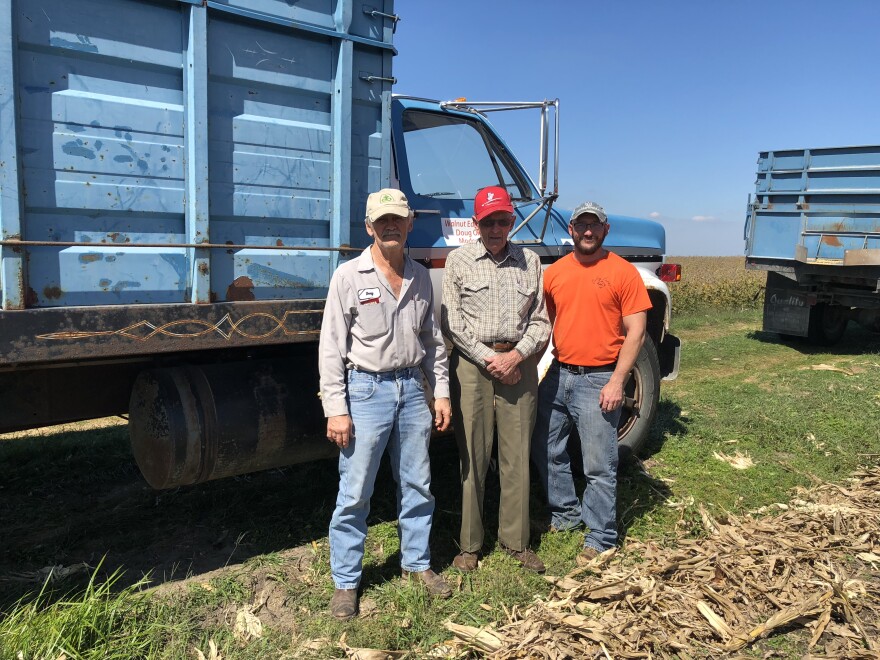There’s been a lot of changes in agriculture through the decades, from the equipment used to the amount of land needed to sustain a livelihood. Gary Oxley is an Illinois man who has been farming for more than 70 years. He discusses the changes he's witnessed first hand.
It was a sunny day, warmer than usual for harvest, when I hopped in Gary Oxley’s silver 98 model Gleaner combine.

The first thing I noticed were his hands. They were worn, aged by the sun, and his gold wedding band slipped down near his knuckle unable to stay in the place where it used to sit as a young man.
Gary is 87 years old. He still sows and harvests seeds on the family farm in Modesto, a small village about 40 miles southwest of Springfield. He started as a teenager, helping his dad and grandpa back in the late 1940s.
“It’s all I’d ever done really and just kind of what I wanted to do," he said. "I just never had any idea of really doing anything else.”
Gary has seen a lot of changes in this job over his seven decades in the fields. In fact, he said not much is the same.
“It’s hard to say how much it’s changed. In '41 my dad traded all the horses and horse drawn equipment off to an Aliss dealer for a tractor."
Allis-Chalmers was a U.S. manufacturer that gained fame for their bright orange tractors and silver combines; the company is long gone.
Sitting in an air-conditioned combine with the radio softly playing old country tunes, Gary reminiced about harvesting crops in machinery that didn’t have a cab.

“Especially if the wind was just right, Aliss-Chalmers combines with a pull tide, had canvases on them. One run this way and the other picked up (the grain) and took it in. That top one would throw grain onto the back of your neck a lot of times. It’s quite different than it is now.”
Of course, today, it’s almost rare to see a combine that harvests less than eight rows at a time. Years ago it might have taken weeks to harvest 100 acres. Today, that can be done in eight hours.
“You could work some pretty cold days," said Gary. "A lot of times we would have been out finishing up in January which I don’t like to do.”
And, a couple hundred acres with some livestock was a livelihood. Today, Gary said farming is starting to resemble a corporation. He’s watched families sell off their ground because they just can’t compete with the ‘big guys.’
“There’s fewer farmers all the time anymore. There used to be a lot of them. You can see ‘em when you drive through the country, where houses have been and are gone.”
In the past five years, farmers have suffered from declining market prices for grain. Gary remembers when they were much lower, but it was just a different time.
“Last year, I believe, corn was about $4 a bushel and I believe beans were $10. You look back in record years, corn might have been $1 and a half, beans $2 but our input prices were much lower too. That makes a difference.”
Gary watched his father and grandfather build the farm from the ground up, gaining valuable life lessons along the way. He also gave credit to the matriarch of the family. His wife of 61 years, Lyla, who maintained a household while managing the books for the farm.

Now he gets to see his son, Doug, and grandson, Brandon, take over. Gary said he hopes they will be able to continue working on the family farm, and remain profitable.
Doug is happy to continue the legacy. He gave his dad all the credit for his knowledge of farming.
“Just about everything," Doug said. "It takes a lot of hard work and you gotta boar down and get it done.”
Brandon echoed his dad's sentiments. He said his grandad taught him: “the value of a hard days work and what you can accomplish if you put your mind to it.”
Maintaining the farm is, and always will be, a family affair. One the Oxley’s are proud to be a part of.
Around the noon hour, we said our goodbyes and I watched the Oxley men slide into Doug’s 1973 Chevy pick-up truck. They headed to lunch at Doug’s childhood home where ham, mashed potatoes, and a vegetable waited for them, cooked by Lyla. These days, most farmers will get something fried at the local pub and eat quickly in the tractor to maximize their time, but Gary insists on a break and a hot meal. Maybe a little old school, but a staple on the Oxley family farm.






